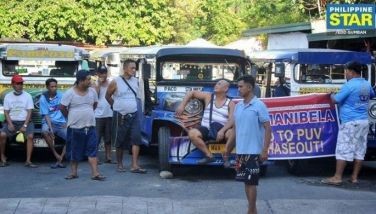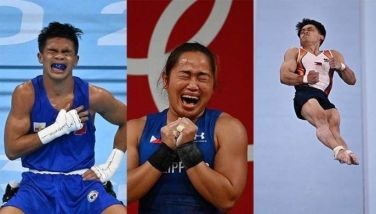Sixto Ylagan Orosa grew up with love of country as the family shibboleth. His father, Simplicio Agoncillo Orosa, manned the frigate Bulusan which transported soldiers and ammunition as the Revolution reached its fevered pitch. After the defeat of the Spanish Armada, Admiral Dewey blistered with anger at seeing the Bulusan still flying the Filipino flag. He dispatched an emissary to order Orosa to lower it. The order was staunchly defied by the valiant captain.
The fierce nationalism of close relatives like Don Felipe Agoncillo was likewise ingrained in Sixto. Don Felipe, regarded a filibustero by the Spaniards, sought refuge in Hong Kong where his wife, Doña Marcela, sewed the Filipino flag with the help of daughter Lorenzana and friend Delfina Herbosa. Thereafter, Gen. Aguinaldo appointed Don Felipe ambassador to represent the Republic at the Treaty of Paris negotiations. Don Felipe’s presence was not recognized, yet the negotiations were on the Philippines! The rebuff remained indelibly etched in Sixto’s mind.
His life and career were closely intertwined with those of his wife Severina. Earlier, she had abhorred taking up medicine but Sixto, since childhood, had dreamed of becoming a doctor, “curing” household help with improvised medicines.
When the idealistic couple pioneered as Christian doctors in Jolo, Sulu — terrorist region then as now! — no Muslims went to the Sulu Public Hospital Sixto headed. Why? The memory of hundreds of Muslims, slain by American soldiers came alive with the sight of Sixto, under US military rule, wearing a major’s uniform and Severina, a captain’s.
When Hadji Butu fell ill and called for Sixto, attendants stared at him menacingly, one of them moving an index finger across Sixto’s throat as a silent threat: “If anything happens to our beloved master, you will die!” After Hadji Butu’s quick recovery, the Muslims flocked to the hospital in droves.
In 1916 to 1926, Sixto and Severina lived through the hazards and travails of an entirely strange way of life, while eluding juramentados who beheaded Christians. When the Orosas said goodbye, copious tears were shed at the pier as Muslim friends recalled the couple’s unflinching fortitude and dedication.
In Manila, as chief of the Division of Hospitals, Sixto prepared the rules and regulations, and a list of hospital equipment which, with modifications, are still in force. Sixto then authored and strenuously lobbied for the Hospital Provincial Act which, becoming law, led to the construction of 17 provincial hospitals throughout the country, with Sixto accounting for every single centavo of the two-and-a-half million pesos — a vast fortune then — entrusted to him for their construction. Incidentally, many of the hospitals are still existing.
For the next ten years, Sixto served as director of the Occ. Negros Provincial Hospital. Here, as chief surgeon, he performed — on record — 5,000 appendectomies without a single mortality. This was before the advent of antibiotics! Sixto also did countless major surgeries, becoming one of the earliest Filipino members of the American College of Surgeons.
Skilled as Sixto was as a surgeon, he was as good a diagnostician. When his daughter Leonor fell ill in Manila, top doctors could not tell what ailed her. From Negros, Sixto asked for her symptoms via a telegram. When the reply came, he cabled back: “Treat her for malaria!” The diagnosis was proven right. Apropos, as Central Bank physician years later, Sixto discovered a case of leprosy which his predecessors had overlooked.
In Negros, he would often take a three-hour ride by car to visit a patient, returning after six hours still energetic. The journey not to be compared to his trudging over dirt roads to visit sick Muslims in their hovels. Prominent Visayans inevitably became his personal friends: Sen. Jose Locsin, Sec. Rafael Alunan, Gov. Isaac Lacson, Eugenio Lopez, Justice Emilio Hilado, Aurelio Locsin, Simplicio and Nicolas Lizares, Luis Gamboa, Rep. Vicente Gustilo, Placido Mapa, Anselmo Diaz, Ambassador Pedro Hernaez, Dr. Jose Soriano.
Manila was the next stop. When war broke out, Sixto, upon instructions, set up emergency Red Cross hospitals, and during bombing raids, while people were in dug-outs, Sixto and Leonor would be cruising the streets in search of casualties. It also fell on Sixto to minister to foreign diplomats and to send a mercy mission ship, bearing wounded American soldiers, to Australia.
Evacuating to Batangas and, later, to Mindoro, Sixto treated patients for free. Once, in Batangas, Japanese officials barged in, wanting to conscript Sixto’s young son Jose. Gallantly, Sixto told the intruders: “Take me instead.” The offer was not entertained, and moved by Sixto’s gesture, the Japanese left Jose alone.
All through his medical career, Sixto found time to write. “The Sulu Archipelago and its People” (World Book Co. NY, 1923) was the first book on the Muslims by a Filipino. A copy of it is in the Rare Books Section of the Harvard U. library. “Through Three Generations” and “Rizal: Man and Hero” followed. Sixto also wrote scores of nationalistic articles and edited a special Rizal issue of the Historical Bulletin. An avid Rizalist, he was conferred the Knight Grand Cross of Rizal by the Knights of Rizal.
His essays on Recto and Laurel were the result of illuminating conversations which ensued after his medical visits, he having been personal physician to his illustrious fellow-Batangueños. Although self-taught in Spanish, he garnered the coveted Premio Zobel in 1957 for his essay “El Patriotismo en las Poesias de Rizal.”
On the centenary of Sixto’s birth in 1992, the Philippine Medical Association presented his family a Medical Heritage Award “For his exemplary professional dedication in the various facets of his medical career, and as a historian, a linguist, a writer, and an embodiment of the cultured Filipino gentleman”.
What was Sixto as a father? Thoughtful and caring. He would do the rounds at night to see the children safely tucked in bed. He would make them read — and paraphrase — magazine articles and make them listen to opera records. His constant admonition was: “Always do your best. If you can’t give a thing your best, don’t do it at all!”





























